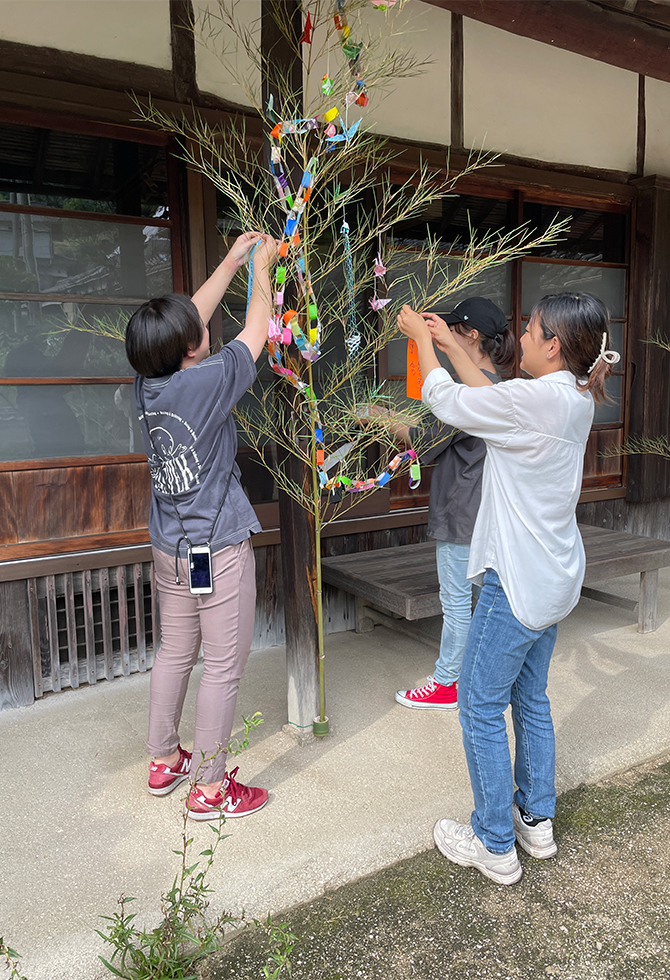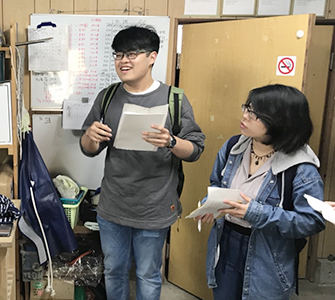Japan and Beyond (Anthropology) Migration and Communities (Sociology) Environment and Health (Anthropology) Governance (Political Science)
Courses in Cultural Diversity and Communities cluster consist of anthropology, sociology, and political science courses that deal with the themes such as cultural identity, migration, environment, gender, norms, health, and political institutions.
Japan and Beyond (Anthropology)
 As an instructor, I want my students to explore the multi-layered connections between peoples and communities. Through anthropological lens, everyday terms and concepts take on new meanings in intercultural contexts. The familiar may suddenly becomes unfamiliar, or something familiar may be discovered in the unfamiliar. Through comparative analysis and self-reflexivity, I encourage students to increase their understanding of historical background and challenge their beliefs. For example, what we often call “Japanese culture” is never singular or static. I encourage students to connect their academic learning to their own lives.
As an instructor, I want my students to explore the multi-layered connections between peoples and communities. Through anthropological lens, everyday terms and concepts take on new meanings in intercultural contexts. The familiar may suddenly becomes unfamiliar, or something familiar may be discovered in the unfamiliar. Through comparative analysis and self-reflexivity, I encourage students to increase their understanding of historical background and challenge their beliefs. For example, what we often call “Japanese culture” is never singular or static. I encourage students to connect their academic learning to their own lives.
Sample Courses: Feminist Ethnic Studies, Korean Diaspora, Topics in Japan and Beyond I and II, Colonialism and War, Cultural Anthropology, Sex Work and Emotional Labor
Migration and Communities (Sociology)
 The increased mobility of people and things across international borders is changing the way we think about the state, communities, and individuals. This interconnectedness, aided by technology, has created opportunities for individuals and organizations, as well as new forms of inequality and conflicts on a global scale. These changes also manifest in our every day lives through the legal system, mass media, schools, workplace, and even arts.
The increased mobility of people and things across international borders is changing the way we think about the state, communities, and individuals. This interconnectedness, aided by technology, has created opportunities for individuals and organizations, as well as new forms of inequality and conflicts on a global scale. These changes also manifest in our every day lives through the legal system, mass media, schools, workplace, and even arts.
Sample Courses: Sociological Imagination, Global Sociology, Sociology of Migration I/II, History of Social Thought, Urban Sociology, Globalization and Development
Environment and Health (Anthropology)

Traditionally, anthropologists tended to look toward cultures very different from their own to find out alternative ways of thinking and relating to the world. Nowadays, anthropologists look somewhere closer to home for new ideas for thinking differently. It can be the people whose existence are often forgotten, or their ways of life… or it can be the new identity-making practices emerging in relation to new technologies, medical concepts, and crises….
Sample Courses: Medical Anthropology, Environmental Anthropology, Anthropology of the Self, Anthropology of Memory, Anthropology of Science
Governance (Political Science)
 When people live together, there is always politics, and politics affects all lives. The courses offered under the label of “Governance,” drawing on political science, examine how politics works in different political communities and how different factors such as ideas, interests, institutions, economics, society, and history affect and are affected by politics. Taking these courses help students understand the complexity of politics and learn how to analyze it systematically.
When people live together, there is always politics, and politics affects all lives. The courses offered under the label of “Governance,” drawing on political science, examine how politics works in different political communities and how different factors such as ideas, interests, institutions, economics, society, and history affect and are affected by politics. Taking these courses help students understand the complexity of politics and learn how to analyze it systematically.
Sample Courses: Introduction to Political Science, Comparative Politics, International Politics, Japanese Politics, Topics in Political Science

